2018 Jaguar F-Type P300 review, test drive
Following the recent facelift, the Jaguar F-type now gets a smaller 2.0-litre, four cylinder engine. Can it still deliver big punches?
Published on Nov 08, 2018 08:00:00 AM
23,627 Views
Follow us on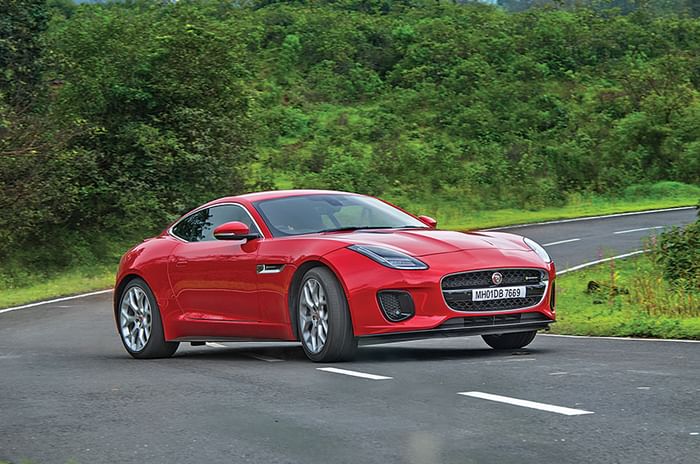
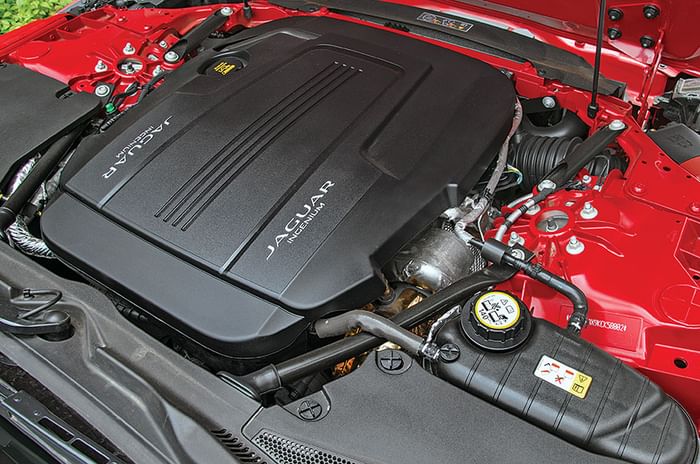
2.0 motor shared with other JLR cars.
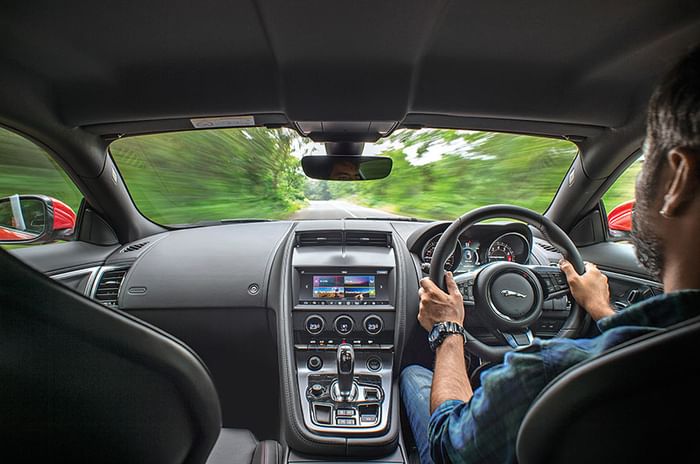
Interiors look a bit ordinary for a sportscar but are driver-focused. Flat-bottom steering is nice to grip and feelsome.
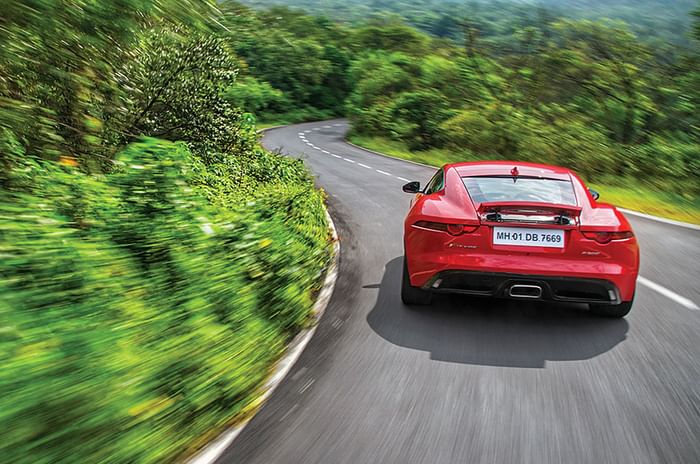
With the lighter engine, handling is more agile than its V8 sibling.
Jaguar describes the F-Type P300 as “the feisty young brother”. Well, that could be quite arguable; yes, it’s still the F-Type and it does put out a decent 296hp but it’s still just a 2.0-litre, four-cylinder turbo-charged engine. Compare that to its 543hp super-charged V8 sibling. Feisty? There was only one way to find out. We have the coupé version (there’s also a convertible) and I head out with it at the break of dawn to Aamby Valley. The thing about driving here from Mumbai is that the route offers a great mix of rough and smooth roads with moderate traffic that thins out progressively and ends up in a delightfully fast and twisty section.
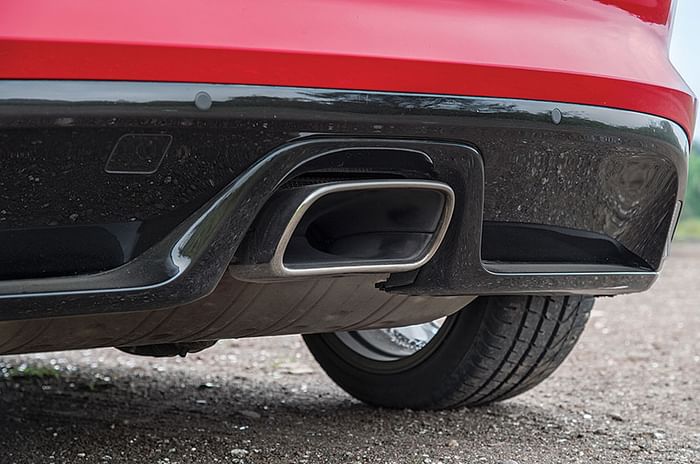
Considering the fact that I had already driven the 543hp super-charged V8 model, I wasn’t very excited with the thought of the all-new 2.0-litre engine putting out just 296hp. But as traffic thinned, these thoughts soon proved to be misgivings. At every open stretch I put my foot down and the motor responded quickly, along with the 8-speed gearbox that kicks down a couple of gears and provides pretty decent grunt.
This motor belongs to the Ingenium family and also powers other JLR cars like the XE, XF, Evoque, Discovery Sport and the Velar. The only difference, though, is that in the P300 it makes a bit more power, at 296hp, and 400Nm of torque. These figures are comparable to its rival from Porsche’s stable – the Porsche 718 makes the same power and has only 20Nm less torque. These figures don’t really sound impressive for a sportscar; but in reality, they aren’t bad and are adequate enough to provide a decent adrenaline rush. Jaguar claims it will do a sprint to 100kph in 5.7sec and in our test conditions it managed a run of 6.1sec with the help of dynamic launch control. Thanks to its quick 8-speed gearbox, the in-gear times were fairly brisk, too. It timed 20-80kph in 4.14sec and 40-100kph in 4.64sec.
| Jaguar F-Pace Price, Mileage, Specifications, Features and Variants | |
|---|---|
| Brand | Jaguar |
| Model Name | F-Pace |
| Jaguar F-Pace Price | ₹ 89.56 lakh |
| Jaguar F-Pace Range/Mileage | NA |
| Jaguar F-Pace Specifications | SUV | 5 doors | 5 seats View All Specs |
| Jaguar F-Pace Features | LED headlight | 10-inch Touchscreen display | 6 airbags View All Features |
| Jaguar F-Pace Variants | 2.0 Petrol R-Dynamic S View All Variants |
 Gets smaller 19-inch alloys. Pirelli tyres offer good grip.
Gets smaller 19-inch alloys. Pirelli tyres offer good grip.
The later hours of the morning in Lonavala saw some traffic and the motor proved to be very easy to modulate and quite tractable, with power coming in nice and low at 1,500rpm. The steering, though, is a bit heavy at these slow speeds but the weight does disappear as you climb higher. The engine loves to be revved. Keep the throttle pinned and it will gradually ease into its 6,400rpm rev-limiter rather than hit it like a wall. On the fast bits there was ample opportunity to do this and the little Jag provides plenty of thrills. It definitely doesn’t feel outright fast or anywhere close to what the V8 motor is but it’s brisk enough.
 New LED cluster design looks great.
New LED cluster design looks great.
As for the ride, a broken, monsoon-ravaged section of road showed another positive side of the F-Type. Unlike most sportscars, the Jag didn’t crash and rattle over the exposed surface, and handled them quite nicely. As soon as I reached the twisty bits and the roads smoothened out, I switched driving mode to Dynamic, turned off ESP and slotted the gear lever into S – party time!
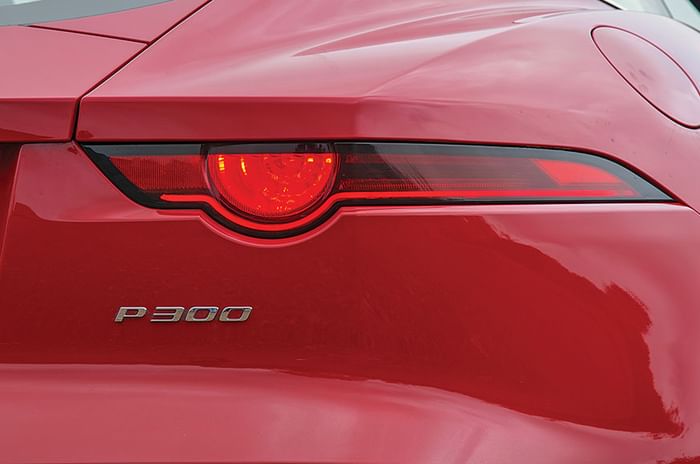 Updated tail-lamps get LEDs too.
Updated tail-lamps get LEDs too.Though it still felt like a typical front-engine rear-wheel drive (which characteristically displays understeer) this cat can put its tail out. Take a wider line carrying just about enough momentum and flick the flat-bottomed steering before booting the throttle fully – and voila, it rewards you with a neat
and tidy oversteer.
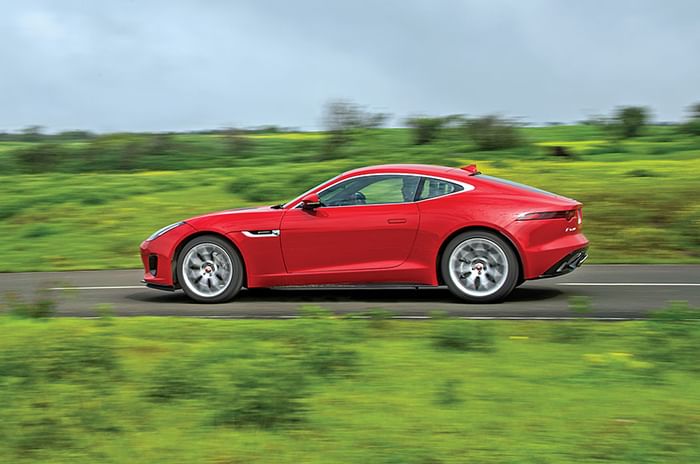
Coming to the styling, as before, the F-Type integrates classic and modern design cues superbly and the P300 carries on with the changes from the 2018 F-Type SVR launched just a month back. The most obvious change on the exterior is the Lamborghini-like centre-mounted exhaust, which looks really neat. The 19-inch alloys get a fresh design too, while other updates include redesigned bumpers and new LED headlamps and tail-lamps. The huge spoiler that deploys automatically once you cross 120kph is quite neat; you can also manually deploy it via a button and though you won’t really feel its effect in most driving instances, it’s worth it for sheer visual drama alone.
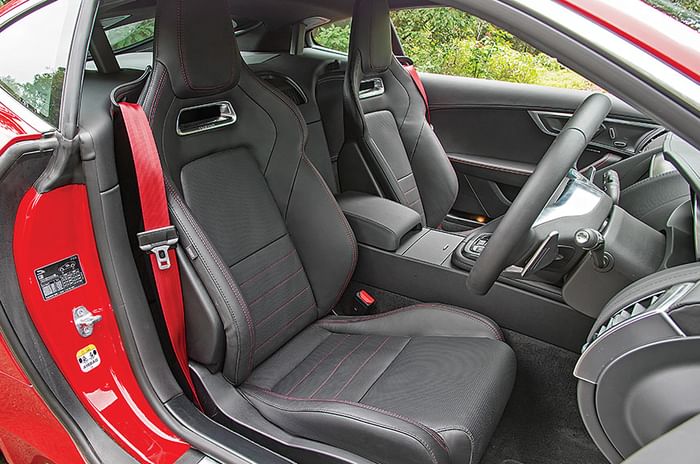
Plonking-in a smaller engine hasn’t really taken away the F-Type’s soul. Sure, it’s not a hooligan like its V8 sibling is but what the P300 offers is the versatility of everyday use and good fuel efficiency (for a sportscar) while still managing to bring a smile to your face. Plus, the biggest benefit of offering a smaller capacity version is that the 2.0-litre, four-cylinder engine now attracts much lower taxes – which makes this F-Type way more affordable. While the top-spec F-Type SVR costs Rs 2.65 crores, this one costs just Rs 93 lakhs. Pocket-friendly rocket? You bet!
Tech Specs 
Copyright (c) Autocar India. All rights reserved.


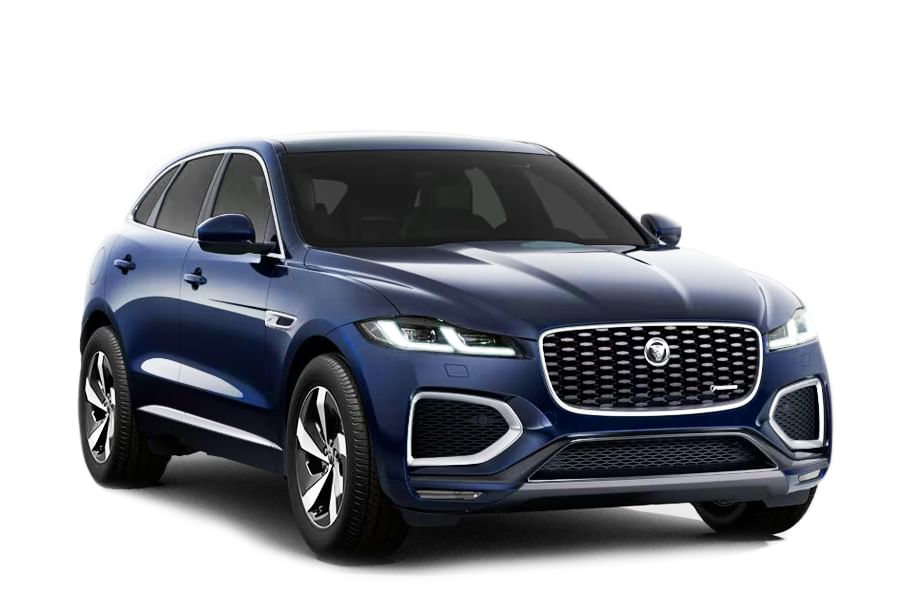


.jpg?w=234&h=156&q=90&c=1)
.jpg?w=234&h=156&q=90&c=1)
 Price
Price Engine
Engine Transmission
Transmission Acceleration
Acceleration Dimensions
Dimensions
Comments
Member Login
Personal Details
No comments yet. Be the first to comment.